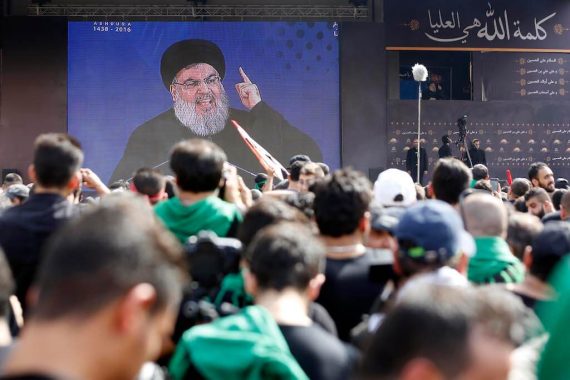Salim Ayyash, a Lebanese citizen and a member of the Lebanese Hezbollah militia, was placed on the United States Department of State’s Rewards for Justice program a month ago. A bounty amounting to $10 million dollars, for any information on his whereabouts was announced on March 29. A few claims stood out from the U.S. Rewards for Justice Department statement.
First off, that Ayyash is “a senior operative in the assassination unit—Unit 121—of the terrorist organization Lebanese Hezbollah,” as per the department’s wording. Also, the statements claimed that the “[U]nit receives its orders directly from Hezbollah leader Hassan Nasrallah.” Lastly, the statement is said to be offering a reward for “information leading to preventing him from engaging in an act of international terrorism against a U.S. person or U.S. property.”
The last claim is particularly important but shall be addressed later.
In a televised interview with the American CNBC business news channel earlier this week, the 77th Maronite Catholic Patriarch of Antioch, and head of the Maronite Church, Lebanese Patriarch Mar Bechara Boutros al-Rahi pulled no punches in describing Hezbollah. Al-Rahi clearly labeled the group as an “Iranian military force in Lebanon to combat Israel.”
The Patriarch went on to say that “Hezbollah shouldn’t remain free in using arms whenever and wherever he wants and shouldn’t be capable of deciding wars in Israel, in Syria, in Iraq, in Yemen, with disregard to the government, the president and the parliament.” In recent months, al-Rahi’s rhetoric against Hezbollah has become more aggressive in congruence with the debilitated political and economic situation in the country.
While those two events are distinct, there is a vector of causality that connects what Ayyash represents and the Patriarch’s recent statements. However, a crucial caveat must be inserted in this case as the Patriarch’s statements should be taken with a grain of salt.
Avenging the Commander
While we are oblivious to the science behind the U.S.’ reward system, common sense stipulates: the heftier the reward, the more important and dangerous the operative may be. In this case Ayyash is no newcomer to the local and international political and security scene. In fact, Ayyash was unanimously sentenced in absentia, back in December 2020, by the Hague-based Special Tribunal for Lebanon to five counts of life in prison over the “intentional homicide of former Lebanese Prime Minister Rafik Hariri with premeditation.”
Following years of independent investigation and an international trial, Ayyash was proven guilty in intentionally assassinating Lebanon’s own ex-Prime Minister. In this context, it is important to underline that Ayyash’s reward is equal to none except that of Amir Muhammad Sa’id Abd-al-Rahman al-Mawla, the current leader of the “Islamic State.”
Even the reward of Abubakar Shekau, who is the leader of the terrorist group “Boko Haram,” responsible for scores of atrocities committed over the past year, did not amount to that of Ayyash’s—equivalent to $7 million.
Nonetheless, the announcement of Ayyash’s reward came only days after an Iraqi-based U.S. Pentagon linguist, Mariam Taha Thompson, pleaded guilty to one count of delivering national defense information to aid a foreign government. Arrested in February 2020, the now 63-year-old Thompson acknowledged a month ago divulging classified information to a Lebanese national with suspected ties to Lebanon’s Hezbollah. Apparently, Thompson had a “romantic interest” in the Lebanese national and she was well-aware he would share the information with the Lebanese militia. Her sentencing is scheduled for June 23, later this year.
Yet, ‘context is everything’, because “nothing exists, and therefore can be understood, in isolation from its context, for it is context that gives meaning,” as per the late American sociologist Alvin Ward Gouldner. A look at Thompson’s court case reveals that the affidavit, which was signed by an FBI Special Agent, alleged that internal logs showed a “notable shift” in Thompson’s computer activity beginning on December 30, 2019.

VIDEO: Iran’s proxies
In a 6-week period, Thompson accessed “dozens of files concerning human intelligence sources, including true names, personal identification data, background information,” and photographs of the sources. Meaning, Thompson’s actions took place during the escalatory trend between the administration of former U.S. president Donald Trump and the regime in Tehran, which played out on Iraq’s own soil towards the end of 2019.
Thompson was activated only a couple of days before the assassination of Iran’s Islamic Revolutionary Guards Corps—Quds Force Commander, Qassim Soleimani on January 3, 2020.
Thompson was activated only a couple of days before the assassination of Iran’s Islamic Revolutionary Guards Corps—Quds Force Commander, Qassim Soleimani on January 3, 2020 when a drone strike at the road leading to the Baghdad International Airport took out his convoy.
As such, the revealed information leads us to two conclusions, with the first being that Thompson’s “alleged” activation ahead of Soleimani’s killing, as per the court case, could possibly lend credence to the first justification, among the many other shifting ones, Trump’s administration gave for killing Soleimani. At the time, members of the Trump administration said that Soleimani, posed an “imminent threat” to American lives, only to be met with cynicism especially from the Democratic Party camp during the 2020 U.S. elections.
However, Thompsons’ “mission,” which spanned for 6-weeks, was meant to offer information that will allow Iran to avenge Soleimani’s killing. While the second conclusion signals Hezbollah’s clear-cut involvement in collecting the information on U.S. personnel—most probably operatives—in the Middle East, in what appears to be complicity with Iran in its attempt to avenge the killing of Soleimani.
While it isn’t clear whether Ayyash was to carry out an attack against U.S. personnel or property, as stated in the “Rewards for Justice” announcement, or whether those attacks were imminent, one cannot but pause and ponder the question of why would Hezbollah, a presumably self-styled Lebanese resistance, spy on the U.S. on behalf of Iran? How does avenging the killing of Soleimani serve the interest of Lebanon and its citizens? And why would Hezbollah get involved, while Lebanon—the group’s supposed homeland— has enough to deal with given the unprecedented economic and financial meltdown and a near full bankruptcy, which the party itself often blames on the so-called “U.S.’ siege of Lebanon.”
Of course, reasons for Lebanon’s economic demise are way more complicated than what is attributed by Hezbollah or other Lebanese sectarian parties, but what needs to be stated is that the financial collapse, is first and foremost, homemade. Meanwhile, an answer to the questions posed above lies in the organic nature of the group and its relationship with Tehran, which is often misconstrued, either due to lack of understanding or for propaganda purposes.
Intelligence Apparatus Turned Political Party
A sweeping majority of Hezbollah’s supporters often present the group to be “an ‘independent’ resistance movement that has grown into a regional power in its own right.” The idea serves to relieve Hezbollah from the “proxy” label, which is often raised by the group’s opponents kinetically leading to questioning on the group’s allegiance and ulterior motives.
Yet, while the proxy claim holds some truth, reality is not what those supporters intend to project. The relationship between the group and Tehran is not an “interdependent symbiosis between close allies.” In fact, Hezbollah was first conceived by Ali Akbar Mohtashamipour, Iran’s ambassador to Damascus in 1982, following years he had spent in Lebanon training with the Palestinian Liberation Organization (PLO) ahead of the revolution in Iran.
According to Iranian writer Arash Azizi’s book ‘The Shadow Commander’, “based on the IRGC’s model, Hezbollah was put together by merging different Shiite armed groups as part of an Iranian transnational Shiite network aimed to represent the external influence of the newly formed Islamic republic and an export-model of its revolution.
More so, Iran assumed the role of the patron, for it would decide on everything important and would arbiter differences.” Azizi adds that “[D]ebates over the degree of Iranian sponsorship of Hezbollah sometimes fail, shockingly, to mention this fact: A majority of the party’s body of leadership consisted of Iranian officials and its composition had been decided upon in Tehran, not Beirut. There was no question about who was calling the shots.”
The group’s Secretary General, Hassan Nasrallah, did not only confirm the organic nature between Dahyeh, Beirut’s southern suburb which acts as Hezbollah stronghold, and Tehran, but he doubled down on that idea back in June 2016 when he aggressively claimed in a televised speech that, “we are open about the fact that Hezbollah’s budget, its income, its expenses, everything it eats and drinks, its weapons and rockets, are from the Islamic Republic of Iran.”
According to Iranian writer Arash Azizi’s book ‘The Shadow Commander’, “[D]ebates over the degree of Iranian sponsorship of Hezbollah sometimes fail, shockingly, to mention this fact: A majority of the party’s body of leadership consisted of Iranian officials and its composition had been decided upon in Tehran, not Beirut. There was no question about who was calling the shots.”
Nevertheless, this must not be mistaken with how senior of a role Nasrallah plays in the regime’s political and theological hierarchy in Tehran. Following the assassination of Soleimani, Nasrallah is said to have been asked to play his role, especially in Iraq, and to organize the Iran-aligned Iraqi factions.
Recommended
A Failed Gambit
The Patriarch’s recent escalation against Hezbollah, his accurate description of the group’s nature and his call to all Lebanese political parties to adopt ‘active neutrality,’ stirred the pot in Lebanon’s stagnating political scene. After all, Hezbollah’s increased influence in Lebanon and elsewhere was facilitated and enabled by local allies, of which was previously the Patriarch himself who often theorized for an “alliance of minorities.” As such, the Patriarch’s words are that of truth by which they intend falsehood.
Lebanon’s economic woes are only set to worsen, with the country’s current crisis resulting from a terrible financial model coupled with extreme levels of corruption and Hezbollah’s organic nature. The former led to the squandering of the nation’s wealth and left over 60 percent of Lebanese citizens below poverty line, with an inability to access their lifelong savings in banks. And the latter is further pushing Lebanon into a pariah state status.
The Patriarch’s scramble to “protect Lebanon,” is in fact an attempt to save the socio-economic and political model set in place exactly 100 years ago, by none other than the Lebanese Maronite Catholic Patriarchy. Al-Rahi’s intention clearly aims for the preservation of an unjust sectarian and highly classist model that has only generated civil wars, lack of sovereignty, and margin for outside meddling, of which Hezbollah is the greatest success story.
Therefore, while Hezbollah stands in the way of the country’s sovereignty, setting a foreign policy that benefits the interests of Lebanon and its citizens, and the government’s right to retain the power to declare war and peace, a solution to Lebanon’s demise cannot be achieved by what the patriarch is calling for.
After all, it is either Hezbollah in its current nature and status stays and the sectarian system cohabitates again with it, in a new form, while a sweeping majority of Lebanese pays the price. Or, Lebanon must be reimagined from scratch, while ensuring in the model’s setup, sovereignty is to be preserved, rule of law reigns supreme and social justice is at the heart of the social contract between the state and society.
In that case, neither Hezbollah and its role could persist, nor will the patriarch have power to exert in an attempt to preserve the current criminal status-quo.
But meanwhile, a sectarian party that was conceived for purposes way beyond Lebanon’s own interests, cannot but be involved in all of the Islamic Republic’s adventures and illicit activity around the globe. The 1994 attacks in Buenos Aires, Argentina, the 1996 Khobar bombings in Saudi Arabia, the 2012 Burgas bus bombing in Bulgaria, the official direct involvement in the Syrian war in 2013, Hezbollah’s history with stockpiling Ammonium Nitrate around the globe and the official support of the Houthi group in Yemen are all cases in point.





